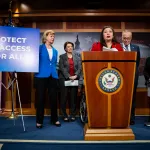Republican presidential candidate Nikki Haley said Wednesday that she sees embryos created through in-vitro fertilization as “babies,” just days after a ruling out of Alabama that fertility treatment advocates say could disrupt access to the procedure.
Haley’s view, first reported by NBC News, illustrates how the issue could become a political litmus test in the post-Roe v. Wade era as conservative leaders who oppose abortion are forced to grapple with the complexity of reproductive health care, the rights of patients and strife within the anti-abortion movement.
A majority of Supreme Court justices in Alabama, which has a total abortion ban in place, said in an unprecedented ruling that frozen embryos created by IVF are children under Alabama law. The ruling stemmed from a civil lawsuit filed by IVF patients who sued a clinic in Mobile under the state’s Wrongful Death of a Minor Act after their embryos were destroyed by a wandering patient who dropped them on the floor in 2020.
Outside of accidental destruction, it’s routine for embryos in any given IVF cycle to be frozen but later discarded because of genetic abnormalities or other problems that could reduce the chances of a successful pregnancy. Embryos can also be discarded because the patient has decided they no longer need those embryos or can’t afford the cost of keeping them frozen.
Since the U.S. Supreme Court’s decision overturning Roe v. Wade, advocates have been increasingly concerned about abortion bans and fetal personhood laws threatening access to IVF. The Alabama court’s decision is already upending access to IVF in the state, leaving patients and providers scrambling.
The University of Alabama at Birmingham’s health system, the largest in the state, announced Wednesday it would temporarily halt IVF care in response to the ruling, AL.com reported. A spokesperson, Hannah Echols, said in a statement that UAB was “saddened” to pause IVF services.
-
Read Next:
“We must evaluate the potential that our patients and our physicians could be prosecuted criminally or face punitive damages for following the standard of care for IVF treatments,” Echols said.
Neither President Joe Biden nor former President Donald Trump has personally weighed in on the ruling, though both have tended to be reticent on abortion. Vice President Kamala Harris wrote Wednesday on X that the decision was “outrageous” and “robbing women of the freedom to decide when and how to build a family.” White House press secretary Karine Jean-Pierre said Tuesday that it was among “the devastating consequences of action by Republican elected officials,” including “undermining access to reproductive care.”
“This is exactly the type of chaos that we expected when the Supreme Court overturned Roe v. Wade and paved the way for politicians to dictate some of the most personal decisions families can make,” Jean-Pierre said.
Asked to weigh in on the Alabama ruling Wednesday, Haley said, “Embryos, to me, are babies. … When you talk about an embryo, you are talking about, to me, that’s a life. And so I do see where that’s coming from when they talk about that.”
The former South Carolina governor has spoken openly about her struggles with infertility, saying in an April speech that she and her husband struggled to conceive their two children because of her own health complications. “We went through countless sessions of fertility treatments,” Haley said at the time. On Wednesday, the former South Carolina governor said she used artificial insemination, not IVF, to conceive her son — a treatment that doesn’t involve creating embryos but that does not result in conception for every patient.
Asked if the Alabama ruling could impact access to IVF treatments, Haley said “we need to be incredibly respectful and sensitive about it.” Haley went on to suggest that women and their partners should be presented with options and “make the decision that’s best for your family.” If conservative courts or legislature deem that embryos have personhood rights, fertility treatment patients could quickly lose that decision-making power.
Haley, Trump’s last standing rival in the GOP primary, will face Trump for a third time in the South Carolina primary on Saturday. Trump remains the faraway frontrunner in the contest.
Biden and Trump’s presidential campaigns did not immediately respond to requests for comment.
The Alabama ruling and Haley’s comments have again thrust into the spotlight questions about how Republicans will reconcile the political popularity of access to fertility treatments, support for strict abortion policies that could have unintended impacts on IVF and calls from some anti-abortion groups to tighten regulations around IVF and embryos. About two percent of American women ages 15 to 44 have tapped IVF to conceive, according to a Pew analysis of the National Center for Health Statistics.
Barbara Collura, president and CEO of RESOLVE: The National Infertility Association, said in a statement that the “cruel ruling, and the subsequent decision from UAB’s health system, are horrifying signals of what’s to come across the country.”
“Would-be parents have invested their hearts, time and financial resources,” Collura said. “Now, less than a week after the Alabama Supreme Court’s devastating ruling, Alabamans in the midst of seeking treatment have had their lives, their hopes and dreams crushed.”






